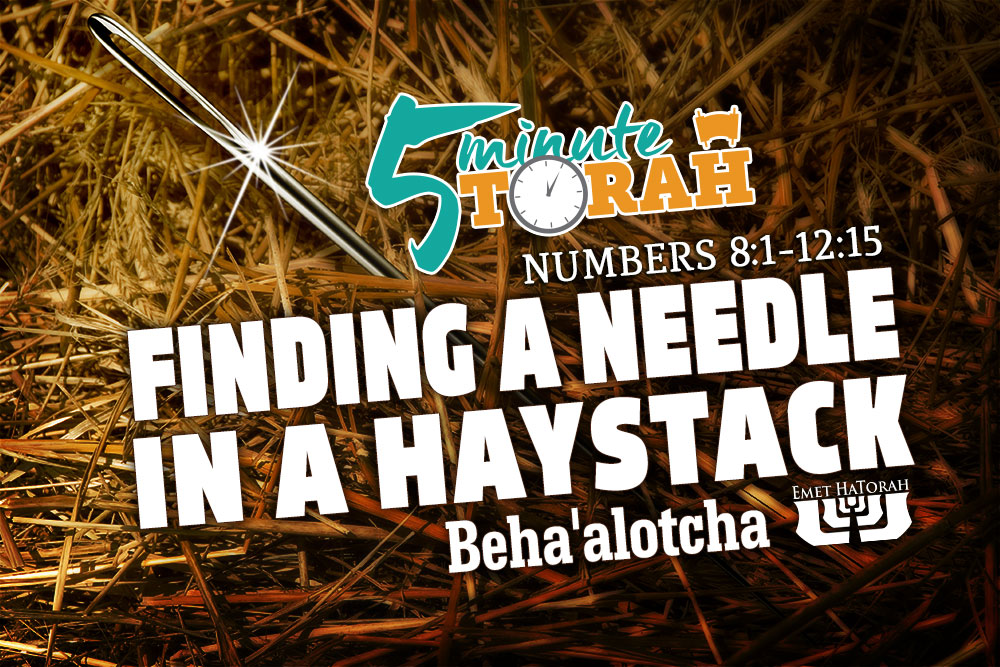Parashat Beha'alotcha - Numbers 8:1-12:15
Series:

Finding A Needle In A Haystack
Our portion begins by describing several events regarding the inauguration of the Levites, the laws of Pesach Sheini (the Second Passover), how the physical manifestation of the cloud by day and fire by night guided the Israelites in their journeys, the instructions regarding the silver trumpets, and the departure of Jethro. From there we hear how the Children of Israel begin to complain to the point of even looking back at Egypt with nostalgia. Their grumblings and ungrateful attitudes invoke anger from their Redeemer, causing the death of many through a plague that struck while they gorged themselves on the meat of quails.
Amid the harsh judgments measured out to the Children of Israel for their complaining and bickering, there is a sub-theme running through this week’s Torah portion like a golden thread woven into a garment. It begins when the LORD tells Moses that He will take a portion of the Spirit given to him and distribute it among a select group of Israelite elders:
Then the LORD said to Moses, “Gather for me seventy men of the elders of Israel, whom you know to be the elders of the people and officers over them, and bring them to the tent of meeting, and let them take their stand there with you. And I will come down and talk with you there. And I will take some of the Spirit that is on you and put it on them, and they shall bear the burden of the people with you, so that you may not bear it yourself alone.” (Numbers 11:16–17)
First, rather than the LORD simply placing the Holy Spirit upon these men, some of the portion of what Moses was to be given was withheld for them. Moses could have easily baulked at this idea. However, he doesn’t complain. He is content with God’s plan, even if it means reducing the portion of what was given to him. He is thankful that God is going to give to others what was, until this time, exclusively his.
The second is when the Spirit is actually given to the elders. When Moses assembles the elders so that the Spirit could rest on them, two of them (for whatever reason) did not come, but remained in the camp. When the Spirit was measured out to them, the two in the camp began to prophesy along with the others who were with Moses. But when they do, they are immediately met with resistance. A youth runs to “tattle” and Joshua becomes indignant, demanding that they be stopped immediately. Moses, however, disagrees and says, “Are you jealous for my sake? Would that all the LORD's people were prophets, that the LORD would put his Spirit on them!” (Numbers 11:29). Rather than becoming jealous, Moses sees the good in the situation and shares his perspective with those who were viewing the event negatively.
The last incident involves the criticism of Moses by his siblings. Hashem takes this personally, and strikes Miriam with leprosy. But instead of becoming indignant and gloating in the punishment of his sister (like most siblings would), Moses pleads with the LORD to deliver her from her sentence. “And Moses cried to the LORD, ‘O God, please heal her—please.’ ” (Numbers 12:13). Although it would seem Moses had an even better attitude than God in this situation, the LORD, in His infinite wisdom, created this opportunity to show the greatness of Moses, the one who was “very meek, more than all people who were on the face of the earth” (Numbers 12:3).
Sometimes finding the strength to turn a negative situation into a positive one can be like trying to find a needle in a haystack. It can seem almost impossible. All we can see is the negative and how all the cards seem to be stacked against us. However, if we look hard enough, we can find the strength to see our circumstances through a different lens. When we recognize that everything God does is ultimately for the good, and that each of life’s experiences are intended to shape us into the man or woman God intends, then life is much more bearable. Moses is a good example of this ability. May his example inspire us to a life of humility and service of others, seeing the good God is doing on our behalf.








